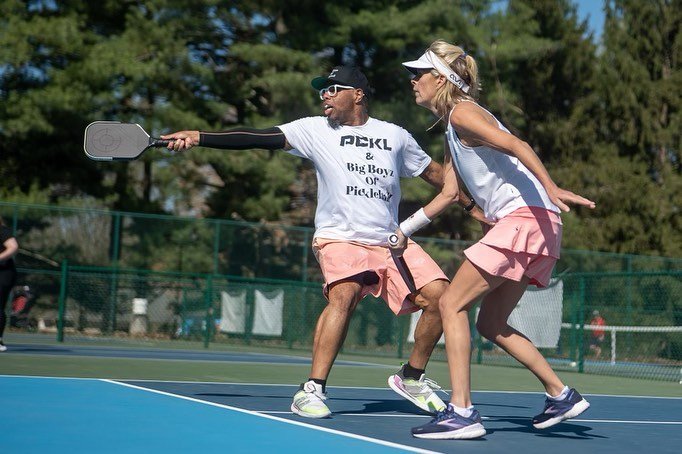Poaching in Pickleball, Good or Bad?
There’s a term commonly used in pickleball for players who are inclined to take a shot that isn’t necessarily a shot that belongs to them. The term is poaching. This refers to moving from one's position to intercept a ball intended for one's partner. This potentially can be a bad strategy for several reasons, yet sometimes it’s a practical part of the game that works to your best advantage.
Just to be completely clear, poaching is NOT hogging. It may have the appearance of that, but poaching is a selective shot, whereas hogging is nearly complete dominance of taking an overwhelming number of shots. In doubles, it is difficult to have complete equity where each partner has the same number of shots, but when it is obvious that a partner is taking an inordinate number of shots, then that’s different than poaching.
In this article, we’ll look at how it’s not only frustrating to some players but also an effective strategy with some teams that it plays to their advantage.
The Bad
The “art” of poaching has some disadvantages. One of the main ones is that it leaves your court open. When you move to intercept the ball, you are leaving your court open, which means your opponent can easily hit the ball to your open court, resulting in an easy point for them. The poach then puts both players on one side of the court, thus leaving one side of the court uncovered. Another, and sometimes unintentional, result of poaching is that it does not instill confidence in your teammate, making them feel like you don’t trust their abilities.
Poaching can also cause communication breakdown between partners. When this happens repeatedly, it affects the team dynamic, creating a downward spiral of confidence. If your partner was counting on you to cover a particular area of the court and you leave that area to poach, they may be caught off guard and need help knowing where to cover, which can lead to confusion and mistakes.
Lastly, deciding to poach a shot requires quick reflexes and accurate prediction of the opponent's shot, which can be challenging to execute. If you miss the ball, your opponent will have an easy shot, which can result in losing the point.
The Good
There is actually a good part to poaching. Simply put, if it’s part of your strategy, it can be a powerful part of your overall game.
In doubles play, remember that the forehand is the preferred shot choice, even if your partner has a decent backhand. Many teams who understand and trust their partner’s decision to take this shot know that they need to adjust accordingly to cover the court adequately. If the opposition returns the ball, they learn to shift over to cover the open court. The Pickleball Guy does a great job in this video describing this:
To be completely clear, there are three types of players in the game of pickleball: recreational players (rec-players), amateurs (ams), and professional players (pros). I mention this because many rec-players like to play casually and don’t care much about whether they hit it or their partner hits it. Whereas amateurs and pros play more competitively in round-robin events or tournaments. Teams who play competitively actually divide the court in a 2/3rd – 1/3rd split where the forehand has the majority of the court due to the consistent strength of the forehand. Many players who play competitively choose this court division as a strategy.
if you play recreationally or every so often, then you can play as evenly as you see fit without worrying about who takes a forehand versus a backhand or who poaches a shot or not. Just have fun!
Summary
Poaching can occasionally be an effective strategy, but it can also be disruptive to your overall gameplay. It's important to consider what type of player you are, recreational, amateur, or maybe even pro, then decide what’s best for you and your partner. Here’s a video from Mark Renneson from Third Shot Sports, who talks all about poaching:
If you want more info on this topic another article we wrote: What is "Poaching" in Pickleball and 3 Tips to Help You Try It





